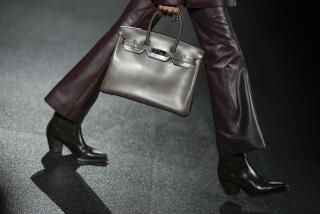Hsu faces lawsuit reminiscent of charges in California case
Democratic fundraiser Norman Hsu agreed Wednesday not to fight extradition from Colorado to California, as a group of New York investors pressed a lawsuit accusing him of swindling them out of $40 million in nonexistent business deals with the likes of Nordstrom, L.L. Bean and Abercrombie & Fitch.
The 56-year-old Hsu was expected to be returned to California today to face charges stemming from an episode 15 years ago with striking similarities to the allegations being made in the New York suit.
In each case, Hsu allegedly presented himself to prospective investors as a prosperous menswear executive who could put together short-term deals yielding hefty profits. He allegedly used some of the investors’ money to maintain the lavish lifestyle that helped convince them he was a successful businessman.
And, as more investors came into the deals, he would use those funds to pay off early investors and keep the scheme going, court documents allege.
“As far as we know -- and we don’t know all we should -- this is a classic situation of taking money from Peter to pay Paul,” Ronald Minkoff, the lead attorney on the New York lawsuit, said in an interview. “When the musical chairs game stopped, our people are sitting with a $40-million loss.”
The FBI and the Securities and Exchange Commission are investigating Hsu’s activities.
The suit, which was filed Friday but attracted little immediate attention, portrayed Hsu as having wooed investors associated with a group organized in part by Joel Rosenman, best-known as a principal backer of the 1969 Woodstock music festival.
The suit alleged that Hsu had misled the group, called Source Financing Investors Ltd., since 2005, pretending to seek financing for apparently fictitious men’s apparel deals organized through two companies he controlled called Components and Next Components.
“While SFI thought that it was investing in a legitimate clothing manufacturing enterprise, it was really providing Hsu with millions of dollars in cash to fund Hsu’s pet political fundraising projects, and an extravagant international lifestyle,” the lawsuit said.
The suit, filed in New York State Supreme Court, said that until this month, Hsu had fulfilled all of his obligations to SFI. The suit called Hsu’s activities a “Ponzi scheme,” and said it began to collapse after news reports revealed Hsu’s role as a major fundraiser for Sen. Hillary Rodham Clinton of New York, the front-runner for the Democratic presidential nomination.
The Los Angeles Times reported last month that Hsu was a fugitive, having failed to show up for sentencing on a 1991 grand theft charge in California.
Trouble came home to SFI investors on Sept. 7. That’s when Hsu defaulted on two contract payments totaling $2.6 million, the lawsuit said. Since then, it said, Hsu has defaulted on an additional $2.6 million in payments. And the litigants anticipate that Hsu will not make payments on more than 30 remaining contracts, which could cost investors a total of $49 million, including interest.
SFI is a Delaware company that was organized by Rosenman and others to provide short-term financing for Components and other Hsu ventures. The lawsuit said that Hsu represented to Rosenman and a partner that SFI funding “was used to provide short-term liquidity to Components to finance, manufacture and import private-label menswear to fill orders Hsu had already received” from retailers such as L.L. Bean, Macy’s, Nordstrom and others.
The suit described a pattern of activity similar to the crime for which Hsu was to have been sentenced to as long as three years in prison before he fled in 1992.
In 1989 and 1990, court documents show, Hsu told a small group of investors that he needed short-term loans to have clothing relabeled and sold at department stores, and later to import and sell latex gloves to a company in Chicago.
Initially, those investors received money within one month, with 6% interest -- similar to the rates of return offered in the New York case. As Hsu’s circle of investors expanded in 1990, he failed to make payments, and left 15 to 20 investors out $1 million.
The New York lawsuit includes an affidavit from a private investigator reporting that the retailers had no record of doing business with Hsu.
Hsu spokesman Bob Emmers of Sitrick & Co. declined to comment on the lawsuit.
According to papers filed in the suit, Hsu operated through Bank of America and Metrobank, an institution based in the Philippines that has a New York branch. He used that branch to write donation checks to Clinton and other politicians.
The Clinton and other campaigns have received letters from SFI attorneys asking them to place any checks or other items of value from Hsu in escrow.
“Our fund lost a lot of money, and we are trying to recover it from whatever sources we can,” said Minkoff, of the law firm Frankfurt, Kurnit, Klein & Selz.
Howard Wolfson, communications director for Clinton’s campaign, had no comment on the request. The Clinton campaign said previously that it would donate Hsu contributions to charity.
--
tom.hamburger@latimes.com
dan.morain@latimes.com
Times staff writer Robin Fields contributed from Los Angeles, and special correspondent Mike Saccone contributed from Grand Junction.






